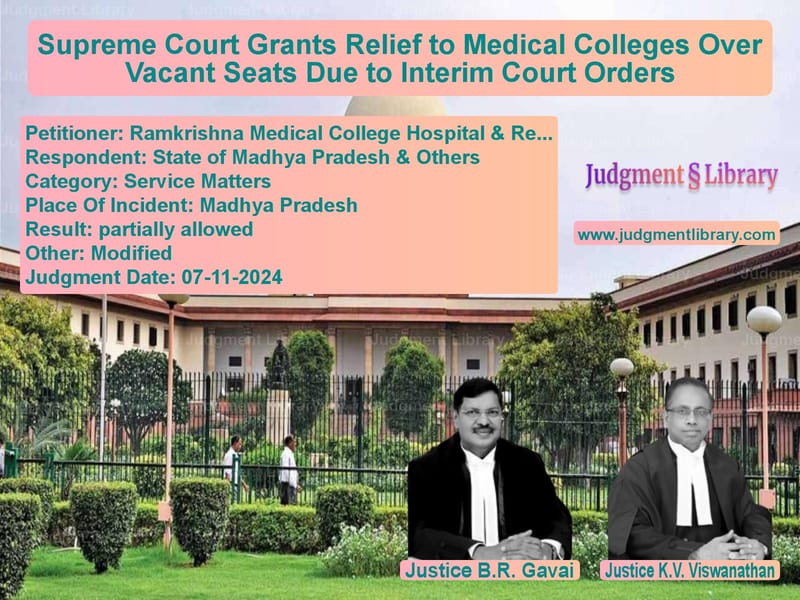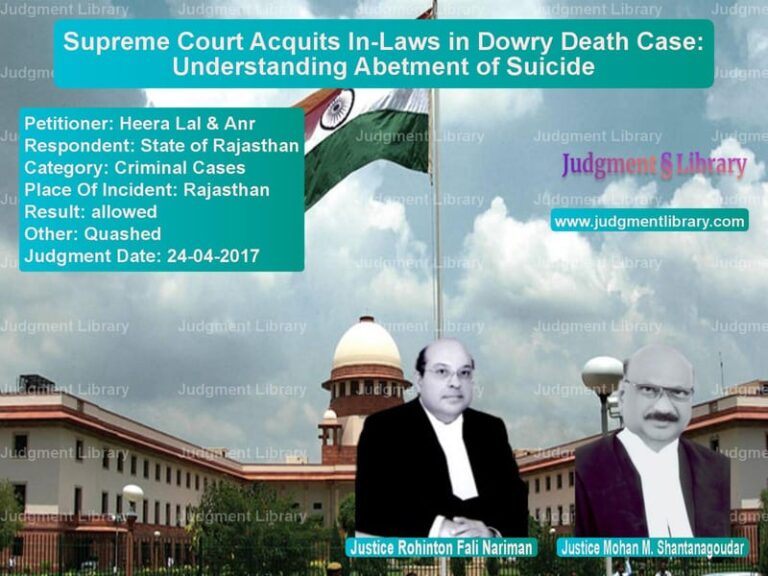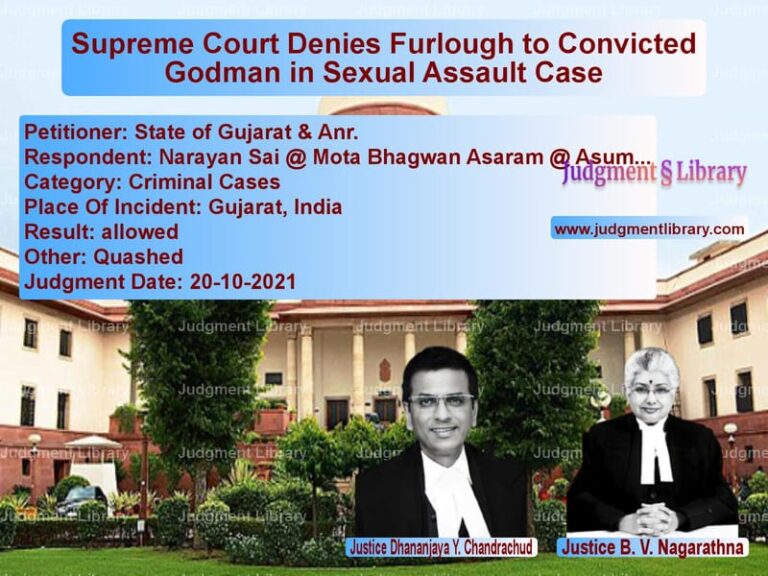Supreme Court Grants Relief to Medical Colleges Over Vacant Seats Due to Interim Court Orders
The Supreme Court of India recently delivered a crucial judgment in Ramkrishna Medical College Hospital & Research Centre v. State of Madhya Pradesh & Others, addressing the impact of judicial interim orders on medical college admissions. The case revolved around MBBS seats that were kept vacant due to court directives in response to student petitions but could not be filled after the petitions were dismissed. The affected medical colleges sought relief for the financial losses incurred due to the vacant seats.
Background of the Case
Two private medical colleges, Ramkrishna Medical College Hospital & Research Centre and RKDF Homeopathy Medical College, filed appeals before the Supreme Court after being adversely affected by interim orders passed by the Madhya Pradesh High Court.
Read also: https://judgmentlibrary.com/supreme-court-rules-against-changing-recruitment-rules-midway/
The dispute began when two students, Mohammad Eaan Shaikh and Tasmiya Khan, filed writ petitions challenging the application of the Mukhyamantri Medhavi Vidyarthi Yojana (Chief Minister’s Merit Scholarship Scheme) during the 2023-24 admission cycle. They contended that an amendment to the scheme, which raised the parental income limit from ₹6 lakh to ₹8 lakh per annum, unfairly affected their chances of securing an MBBS seat.
The High Court, through an interim order dated 22 September 2023, directed that one MBBS seat in each of the two colleges be kept vacant until the final resolution of the petitions. However, by the time the petitions were dismissed, the admission process had ended, and the seats remained unfilled for the entire academic year. The colleges sought compensatory relief for the financial loss incurred due to the vacant seats.
Supreme Court’s Observations
The Supreme Court critically analyzed the implications of granting interim reliefs that disrupt established admission processes. The key observations included:
- Interim orders must be granted cautiously, ensuring that they do not cause irreparable damage to other stakeholders, including educational institutions.
- Medical seats are time-bound and cannot be carried forward to the next academic year.
- The vacant seats resulted in a loss of revenue for the colleges, affecting their ability to maintain financial and infrastructural stability.
- Judicial intervention in admission processes should be exercised with extreme caution to prevent unnecessary disruption.
The Court stated:
“Interim reliefs should not be granted in a manner that prejudices third parties who are not at fault. Courts must exercise judicial restraint and ensure that interim orders do not cause disproportionate hardship.”
Read also: https://judgmentlibrary.com/reinstatement-of-uppcl-technicians-supreme-court-overturns-termination/
Key Arguments by the Parties
Petitioners’ Arguments (Ramkrishna Medical College & RKDF Homeopathy Medical College):
- The colleges suffered financial loss due to vacant MBBS seats, which could not be reallocated.
- The institutions were not responsible for the delay in admissions caused by the student petitions.
- They should be granted compensatory seats or financial reimbursement for the loss incurred.
Respondents’ Arguments (State of Madhya Pradesh & Others):
- The State complied with the High Court’s orders and was not responsible for the vacant seats.
- Judicial intervention in the admission process was beyond their control.
- Compensatory seats for the next academic year would violate medical admission regulations.
Supreme Court’s Final Judgment
The Supreme Court acknowledged the financial loss suffered by the colleges and provided a unique solution:
- The colleges were allowed to approach the Fee Fixation Committee/Fee Fixation Authority for financial compensation.
- The committee would consider the revenue lost due to the vacant seats while determining fee structures for future batches.
- This method ensured that colleges could recover their losses without violating admission regulations.
- Judges emphasized that future interim orders affecting admissions should be granted only after careful consideration of all stakeholders.
The Court stated:
“The loss suffered by educational institutions due to judicial orders should be addressed fairly. Directing compensatory seats would disrupt future admissions, but financial compensation through fee adjustments is a viable remedy.”
Impact and Significance
This ruling sets an important precedent for handling similar cases in the future. Key takeaways include:
- Courts must be cautious while granting interim reliefs that impact admissions.
- Educational institutions must be protected from unintended financial losses due to judicial interventions.
- Fee compensation is a viable alternative to ensure that institutions remain financially stable.
- Regulatory bodies must ensure that admission processes remain transparent and predictable.
Conclusion
The Supreme Court’s ruling in this case provides a balanced solution to a complex problem. By allowing financial compensation instead of compensatory seats, the judgment upholds fairness while maintaining the integrity of the admission process. This decision serves as a guiding principle for future cases where judicial intervention affects institutional revenue, ensuring that colleges do not suffer undue hardship due to unforeseen legal delays.
Petitioner Name: Ramkrishna Medical College Hospital & Research Centre.Respondent Name: State of Madhya Pradesh & Others.Judgment By: Justice B.R. Gavai, Justice K.V. Viswanathan.Place Of Incident: Madhya Pradesh.Judgment Date: 07-11-2024.
Don’t miss out on the full details! Download the complete judgment in PDF format below and gain valuable insights instantly!
Download Judgment: ramkrishna-medical-c-vs-state-of-madhya-prad-supreme-court-of-india-judgment-dated-07-11-2024.pdf
Directly Download Judgment: Directly download this Judgment
See all petitions in Public Interest Litigation
See all petitions in Legislative Powers
See all petitions in Recruitment Policies
See all petitions in Institutional Arbitration
See all petitions in unfair trade practices
See all petitions in Judgment by B R Gavai
See all petitions in Judgment by K.V. Viswanathan
See all petitions in partially allowed
See all petitions in Modified
See all petitions in supreme court of India judgments November 2024
See all petitions in 2024 judgments
See all posts in Service Matters Category
See all allowed petitions in Service Matters Category
See all Dismissed petitions in Service Matters Category
See all partially allowed petitions in Service Matters Category







